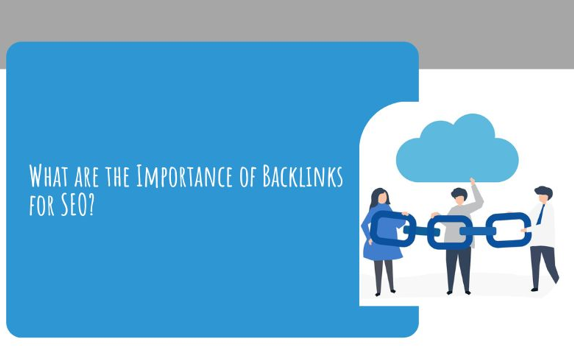Backlinks are an essential part of SEO. They aid in the development of your site’s page authority and domain, both of which contribute to search result rankings. Backlinks, however, are essential for reasons other than these.
We frequently compare Google to a popularity contest, with hundreds upon thousands of pages vying for first place, impacted by dozens of factors. The value of a backlink can be measured by its importance as a “vote of confidence” among websites, and its persuasive power to rank highly in Google’s search results.
An SEO company uses both on-page and off-page SEO strategies to usually gain a great deal of organic traffic. Backlinks are considered an off-page SEO strategy.
A website with numerous high-quality backlinks will typically rank higher than an otherwise equal site with fewer backlinks because search engines consider backlinks as indicators of the quality of the content that is linked to.
The development of links is an important part of SEO for many business owners and marketers. We’ll look at the genuine value of backlinks in terms of SEO in the sections below.
What Is the Definition of a Backlink?
Links between websites produce backlinks. Alternatively, they are called incoming links or inbound links.
If a Digital marketing website (Website A) connects to a blog article comparing the best SEO Services (Website B), the hiking gear website gets a vote of confidence – or backlink – from the mountain climbing website.
Due to the complexity of search engine algorithms, backlinks have lost some of their effectiveness. However, they still affect the strength and credibility of your site.
Because page authority and domain are important markers of how trustworthy search engines view your website, this is the case.
It will be ranked higher for the specific keywords you selected during keyword research if it is more authoritative. Not to add that backlinks provide a way for people to reach your website.
Backlinks are divided into two categories:
Follow Backlinks: Backlinks that are followed directly add to your site’s domain and page authority and pass on website strength.
No-follow Backlinks: Backlinks that do not pass on-site authority are nonetheless significant since they might help people find your site more easily.
Now let’s move toward one of the most crucial topics, ‘how important are backlinks for the SEO of your website?’
What Are the Importance of Backlinks for SEO?
Backlinks aid in the improvement of your website’s ranking, and there is no indication that they will cease to be an essential part of any SEO plan.
Since they serve as a “vote of confidence” from one site to the next site, they are significant for SEO. Above all, it is frequently stated that they are essential to high SEO rankings.
To put it another way, having more links to your website makes it easier for search engines to understand that other people have validated your content.
Backlink is beneficial since search engines will begin to rank your site higher in the SERPs due to this. Backlinks, in other words, are valuable to your search visibility and rating.
Here are some of the importance and advantages of backlinks for your website:
1. Enhances Organic Search Results
If search engines identify your website as an expertise, they will start to rank it better in the SERP. Remember that Google favors websites that consumers frequently visit and about topics they search for regularly.
That is, if you have a lot of high-quality backlinks, Google thinks your site is a trustworthy and essential source of information on that topic.
It’s essential to keep in mind that excellent backlinks are generated over time. Therefore, avoid being duped into gaining more and more backlinks using deceptive approaches.
Such backlinks may provide you with the required traffic, but you will eventually notice how poorly your sites are crawled and rated by search engines.
2. Increases Brand Recognition
When other websites link to you, they think their viewers will benefit from what you offer. Getting high-quality backlinks also indicates that people on trustworthy websites suggest your site and brand to their readers, resulting in more interested visitors.
Once visitors are on your website, you may direct them to additional content using a “Related Information” button at the conclusion of your blog.
This allows consumers to read more material on your website and spend more time on it, which are factors Google takes into account when ranking your website.
3. Referral Traffic Is Increased
Backlinks are crucial for boosting relevant traffic. Google Analytics counts a click from a backlink as a referral visit if a visitor reaches your website through it.
In essence, referral traffic is more targeted and relevant than other types of traffic and has a lower bounce rate.
4. Establishes Your Company as an Authority
When more websites connect to you, your business is recognized as an authority on a particular good or service, problem, or field. Keep in mind that Google analyzes backlinks as one of the factors in determining what your website is about.
As Google is able to learn more about your business with more backlinks, so the more links you have, the better.
5. Backlinks Help in Establishing Links Between Websites
When you link to or advertise another website, people can see the relation between the two, and when they perceive that you have an open relationship online, they are more likely to trust you.
Please don’t make the mistake of thinking that exchanging links with every website will benefit you; it will only cost you in the long run. Only exchange links with websites that have been authorized.
6. More Backlinks Come Organically as a Result of Previous Backlinks.
Another advantage that many individuals are unaware of. If you already have some high-quality backlinks on well-known websites, a small percentage of those people will write about you and submit guest post on technology and link to you.
Is It True That All Backlinks Are Valuable?
While all backlinks are desirable, not all backlinks are equally valued. Some are naturally better to gain, while others should be avoided at all costs.
For link building and analyzing the health of your backlink profile, it’s critical to understand the factors that determine backlink value.
1. Follow vs. No-Follow Backlinks
Individual links may or may not pass link equity, according to the preferences of the website owner.
A follow link transfers link equity – also known as “link juice” – to the linking domain, whereas a no-follow link does not. While followed backlinks from high-quality websites are preferable, no-follow links from high-quality websites might help you build your brand.
(It’s worth noting that local SEO strategies equally value both follow and no follow links from relevant, localized websites.)
2. The Linked Domain’s Authority
Backlinks from new, spammy, or low-quality websites don’t have as much value as backlinks from high-authority linking domains (link equity). In order to avoid spammy backlinks, make sure you avoid websites that link to them.
3. Relevance of the Link
If a backlink is irrelevant, Google can tell. If a fantastic coffee brew in Boston connects to your Colorado hiking gear store, the backlink is not as relevant and will likely not pass as much link juice as a mountain climbing site link.
4. The Location of the Link
The structure of a website and the placement of a link on a page are important to Google. A hyperlink placed at the bottom of a page, for example, may not carry as much weight as one set in a related blog post paragraph.
5. The Number of Links
A backlink that appears among hundreds or thousands of other links on a single page is unlikely to be as beneficial as one among fewer. A visitor might have trouble identifying your link among hundreds and clicking through to your site.
6. Use of Anchor Text
The visible characters or words that represent a hyperlink within the material, sometimes underlined and specially colored, are referred to as anchor text. In the above sentence, “anchor text” refers to the anchor text for an outbound link. Some anchor text is considered SEO-friendly and passes more equity than others. It is preferable to have a concise, pertinent, and unique text.
For example, rather than linking to this blog post with the generic text “click here,” connecting with the anchor “importance of backlinks for SEO” is preferred.













